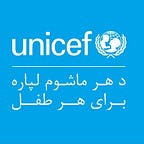Futuristic thinking, transformational change: The road to the Golden Village
By Nicole Foster with reporting by Sahraa Karimi and Sohaila Khaliqyar
BAMYAN, Afghanistan, 20 June 2016 — “This has been an awakening experience. I realized that I have to leave my pain and sorrow behind and focus on the possibilities that the future has to offer.” These were the words of Zahra, 20, a participant of the first of four workshops that are opening the pathway to what will be known as ‘Golden Villages’ across Afghanistan.
Zahra joined 170 participants, including motivated and committed community members, community health workers, religious leaders, service delivery providers and provincial authorities, from 28 villages in Bamyan province in the Central Highlands region of Afghanistan, as they gathered to create a collective vision of the future of their village.
“Many people in Afghanistan, especially in remote villages, are not aware of of the importance and benefits of girls’ education. When I go back to my village, I will advocate and encourage people in my community to send their children to school, especially their daughters.” — Hamida
Access to health, education, nutrition and protection services are the right of every child and family. Yet too many Afghans continue to miss out on essential health care, suffer from stunting, remain out of school, and are married too early.
While progress is being made in different ways across Afghanistan, UNICEF and the Government of Afghanistan, sought to conceptualize an original approach that would respond to the challenges facing the country in an integrated way, cutting across issues that are too often tackled independently.
“It aims to bring all key actors, from the community to government authorities and service delivery functionaries to the media, in the same room, adopting a ‘whole system’ approach to achieving results,” says Sharad Agarwal, the Communication for Development Specialist leading the Golden Villages Initiative with UNICEF Afghanistan.
The Golden Villages Initiative
In Afghanistan today, nearly half of children under the age of one are missing out on immunization services; more than 60 per cent of women still deliver without skilled support; more than 40 per cent of children under five are stunted; and 3.5 million children are out of school, more than 60 per cent of them girls.
In addition, nearly 62 per cent of Afghan women currently aged 30–39 were married before their 18th birthday, one of the highest rates of child marriage in the world.
“I really feel the workshop made people understand and believe in their power and creativity, and their ability to drive their own future.” — Gul Jan
The Golden Villages Initiative offers a vision to tackle these challenges in a collective and transformational way. To achieve the so-called ‘golden status’, a village must reach the following five goals:
1. All deliveries are attended by skilled birth attendants;
2. All infants under the age of one are fully immunised;
3. All children under the age of two are growing adequately;
4. All girls under 16 are enrolled in school;
5. And no marriages occur before 18.
“I learned many things about how women should care for themselves during pregnancy and how important it is to vaccinate children. We also talked about how important it is to send our daughters to school and not push them to get marry before they turn 18. I hope my village can become a Golden Village.” — Sayed
“The Golden Village is where elders, youth, mothers and fathers collectively commit to, and act on, achieving their own golden vision for their community. It is where dialogue and action unfold towards an image that they craft together,” explains Ms. Agarwal, emphasizing the collective ownership that communities will have in the process.
“Because communities feel heard and understood, they can enjoy the richness of their social capital,” she added.
Futuristic thinking, transformational change
At the heart of the Golden Villages Initiative is Appreciative Inquiry, a methodology rooted in amplifying personal strengths to generating transformational change.
“Appreciative inquiry is a way of discovering the pride, glory, wisdom and strength that exist in communities. It is a method of inventing possibilities and drawing the active image of the future in the present,” said Nara Bahadur Karki, a UNICEF consultant and Appreciative Inquiry practitioner, speaking during the inaugural workshop.
“This happens in a context where people become free of fear and blame,” he added.
In practice, Appreciative Inquiry means that communities and authorities are encouraged to recognize their collective strengths, reaffirm their sense of responsibility, and take ownership of the health, education and protection of their children, while they commit to achieving a set of aspirational goals within a mutually defined time frame.
“To change our village to a golden village, everyone needs to do their part and it is easier when people in the community realise their own power. As a young mother, I will start advocating for the health of mothers and children, working with community elders to make sure that all pregnant women deliver with a skilled birth attendant.” — Zahra
“I got married at 15 and I was very interested in going to school, but at that time, it was rare for girls to go to school,” said Masouma, one of the workshop participants. “But after I got married, my husband motivated me to go to school. With his support, I graduated from school and I now work as a teacher for literacy classes in my village.”
Today, Masouma is planning on leading the way in her village.
Referring to the fifth criteria on the Golden Village goal list, she was clear about her personal journey ahead:
“After these days here, I feel like I should do a lot more. I am a member of a council of 113 people in my village. I will work with them and start advocating so that we can become a golden village”.
